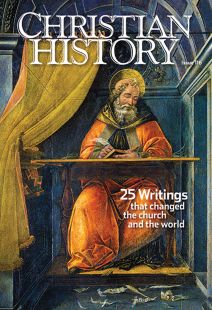Not concerning the heart but the life
THEY WERE THE TWO GIANTS of the eighteenth-century evangelical revival. Fitting for men from a century known as the “Age of Reason,” both were university-trained, articulate defenders of faith they believed reasonable. But reason was not all. They saw love as the fountain and heart-warmed affections—we might use the word “emotions” today—as a stream (to use Edwards’s words) that waters an interior life that flowers into holy actions.
Order Christian History #116: Twenty-Five Writings that Changed the Church and the World in print.
Subscribe now to get future print issues in your mailbox (donation requested but not required).
Opposites attack
Ironically, Calvinist Edwards (1703–1758) and Arminian Wesley (1703-1791) each considered the other’s theological posture an abomination. For famed preacher Edwards, proud heir of Puritans, Arminianism reduced Christianity to an outward moral code without a divinely induced personal experience of salvation grounding an authentic Christian life. As he wrote in A Treatise Concerning Religious Affections (1746), “True religion, in great part, consists in holy affections.”
For Anglican Wesley, Calvinism—more pointedly, the doctrine of predestination—undermined human effort and good work and led to lawlessness. In biting satire aimed at August Toplady, author of beloved hymn “Rock of Ages,” Wesley wrote, “The elect will be saved do what they will; the reprobate will be damned, do what they can.” He abridged Edwards’s Treatise for his followers from 346 pages to a mere 69, assuring readers that “out of this dangerous heap, wherein much wholesome food is mixed with much deadly poison, I have selected many remarks and admonitions which may be of great use to the children of God.”
Still Edwards’s attacks on Arminianism and Wesley’s forays against Calvinism do not tell the whole story. Indeed, isolated from the context of their works and their lives these differences are downright misleading, for Edwards’s Treatise and Wesley’s most reprinted controversial work, A Plain Account of Christian Perfection, have much in common. Both were primarily written to defend their movements, not from external enemies, but from the excesses of their supporters.
Seeking experience or seeking holiness
Edwards’s work on religious affections, delivered first in 1742–1743 as a series of sermons at the Connecticut River Valley church that he had served with distinction since 1726, did not appear in book form until 1746. It was the fourth work on a subject near and dear to its author: revivals of religion.
Edwards’s earlier works on revival had been primarily narratives. This work was theological, introspective, and critical. Edwards had learned through bitter experience that revival declined through emotional excesses of people seeking a religious experience instead of a holy life. Edwards believed that experience could often be misleading: “living on experiences, and not on Christ is more abominable in the sight of God, than gross immoralities of those who make no pretenses to religion.”
Edwards also wanted to answer critics of revival itself such as Charles Chauncy. Chauncy, pastor of Boston’s Old Brick Church, openly attacked revival’s use of fear and appeal to “vulgar sentiments.” Horrified by irregular preaching or exhorting by unauthorized “young men or lads” and even women, who were often not above attacking the clergy themselves, Chauncy feared that revivals exploited emotions and threatened the fragile social order. The Treatise is Edwards’s thoughtful defense of the role of emotions in Christian experience and a detailed warning about the dangers of a misplaced emphasis.
On the surface A Plain Account of Christian Perfection (1777) is a very different work. A compilation of Wesley’s writings on Christian perfection over nearly 30 years, it begins with an essay explaining Wesley’s controversial views on the subject and includes excerpts from Charles Wesley’s hymns and the tract The Character of a Methodist, which Wesley called his first description of a “perfect Christian.”
But the heart of A Plain Account consists of Wesley’s response to the explosion of claims of “full salvation” or Christian perfection among his followers that occurred in the decade after 1757. Extravagant claims by untrained but zealous followers, including setting a date for the second coming of Christ, led to the expulsion of several London preachers and their followers from the Methodist societies.
In their search for the character of true religion, both authors found similar answers. In words that could have been written by Wesley, Edwards proclaimed that “Christian practice or a holy life is a great and distinguishing sign of true saving grace.” Edwards, the Calvinist, and Wesley, the Arminian, both saw Christian practice as the product of a supernatural new birth and as Christianity’s distinguishing mark. Both viewed Christian love not as an emotional experience but as an underlying spiritual reality. Wesley, in a fitting summary of his and Edwards’s view of how one identifies a “real” Christian, wrote in 1747: “The question is not concerning the heart but the life.” CH
This article is from Christian History magazine #116 Twenty-Five Writings that Changed the Church and the World. Read it in context here!
By William Kostlevy
[Christian History originally published this article in Christian History Issue #116 in 2015]
William Kostlevy is director of the Brethren Historical Library and Archives.Next articles
Support us
Christian History Institute (CHI) is a non-profit Pennsylvania corporation founded in 1982. Your donations support the continuation of this ministry
Donate




